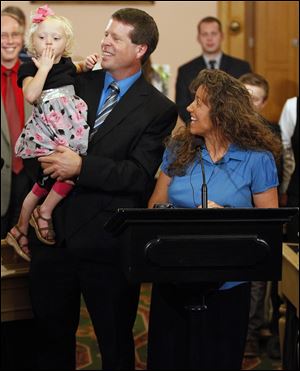
GENERAL ASSEMBLY
Ohio abortion bill could be strictest in U.S.
‘Heartbeat’ plan might impose ban at 6 weeks
8/17/2013
Michelle Duggar speaks about her youngest child, Josie, who is being held by her father, Jim Bob, at a news conference that announced the resurrection of the anti-abortion rights heartbeat bill, at the Statehouse in Columbus.
COLUMBUS — Ohio foes of abortion rights Thursday resurrected what could become one of the strictest abortion laws in the nation, arguing that other recent gains in their movement do not go far enough.
Federal judges in North Dakota and Arkansas either have struck down or placed on hold similar measures, but Reps. Christina Hagan (R., Alliance) and Lynn Wachtmann (R., Napoleon) are forging ahead by introducing a revised version of the so-called Heartbeat Bill to ban an abortion once a fetal heartbeat is detected. That could occur as early as six weeks after conception.
A similar measure divided abortion-rights opponents last session. It passed the House but failed in the Senate. “It’s going to be different this time…,” said Mark Harrington, executive director of Created Equal. “There’s no certainty in politics, but we’re never going to give up.”
RELATED: Experts say decision on abortion likely to stand
Ms. Hagan, however, said she’s received no assurances that the Senate, also controlled by Republicans, will consider the bill this time. “There’s a little bit of hesitation,” she said.
Supporters, surrounded by 17 of the 19 Duggar children featured in the cable reality show 19 Kids and Counting, made it clear that part of their plan is to get a case before the U.S. Supreme Court. They hope the makeup of the bench has changed enough over the years to overturn Roe vs. Wade, the landmark 1973 decision that legalized abortion.
“Here we go again,” said Kellie Copeland, executive director of NARAL-Pro-Choice Ohio. “It strikes me that — a month after the governor signed one of the most restrictive anti-choice bills in the country, and we’re looking at the Department of Health closing abortion-care centers, reducing funding for family planning providers, and mandating medical procedures that may or may not be necessary — that’s not enough for the backers of what I consider to be the ‘heartless bill.’
“Whether it’s the approach Ohio Right to Life and its partner John Kasich have taken to close clinics or the approach the ‘heartless bill’ is taking, the goal is to outlaw abortion and overturn Roe vs. Wade,” Ms. Copeland said. “It’s a different strategy, but the goal is the same.”
Adding Ohio to the mix of court challenges couldn’t hurt the effort to get a case before the Supreme Court, even if state taxpayers must foot the bill to defend the law, Mr. Wachtmann said.
“I don’t think the justices of the Supreme Court are immune to both public opinion, reading news, and things like that,” he said.
The bill is just the latest in a series of measures designed to throw up roadblocks to abortion.
Ohio law requires a doctor to conduct tests to determine whether the fetus, at 20 weeks of gestation, would be viable outside the mother’s womb. It prohibits an abortion if the answer to that question is “yes.” The bill contains exceptions if the mother’s health is in danger.
The law has not been challenged.
The state budget passed by Republicans and signed by Mr. Kasich at the end of June wrote into law a state health department rule that required abortion clinics to have written agreements in hand with a hospital to handle emergency medical situations that might arise.
The budget then narrowed the clinics’ options by prohibiting publicly funded hospitals and the doctors affiliated with them from entering into such agreements.
The Center for Choice abortion clinic closed earlier this summer after it could not find a Toledo-area hospital to sign a transfer agreement. Capital Care Network, the sole remaining abortion clinic in Toledo, is also in danger of closing as it lacks a transfer agreement.
The budget also took a page from the prior Heartbeat Bill by requiring a doctor to perform an external ultrasound to detect a fetal heartbeat and then offer to let the patient hear or see that heartbeat. The Republican budget also placed Planned Parenthood at the end of the line when it comes to distributing federal family planning dollars.
Despite his signature on the budget, the governor was noncommittal about the latest Heartbeat Bill on Thursday afternoon.
“I just heard about it an hour ago,” he said. “We have lots of bills that go through the legislature, and at the end of the day, it’s up to the legislature to see how they’re going to move. I just don’t really have a comment on it.”
Contact Jim Provance at: jprovance@theblade.com or 614-221-0496.